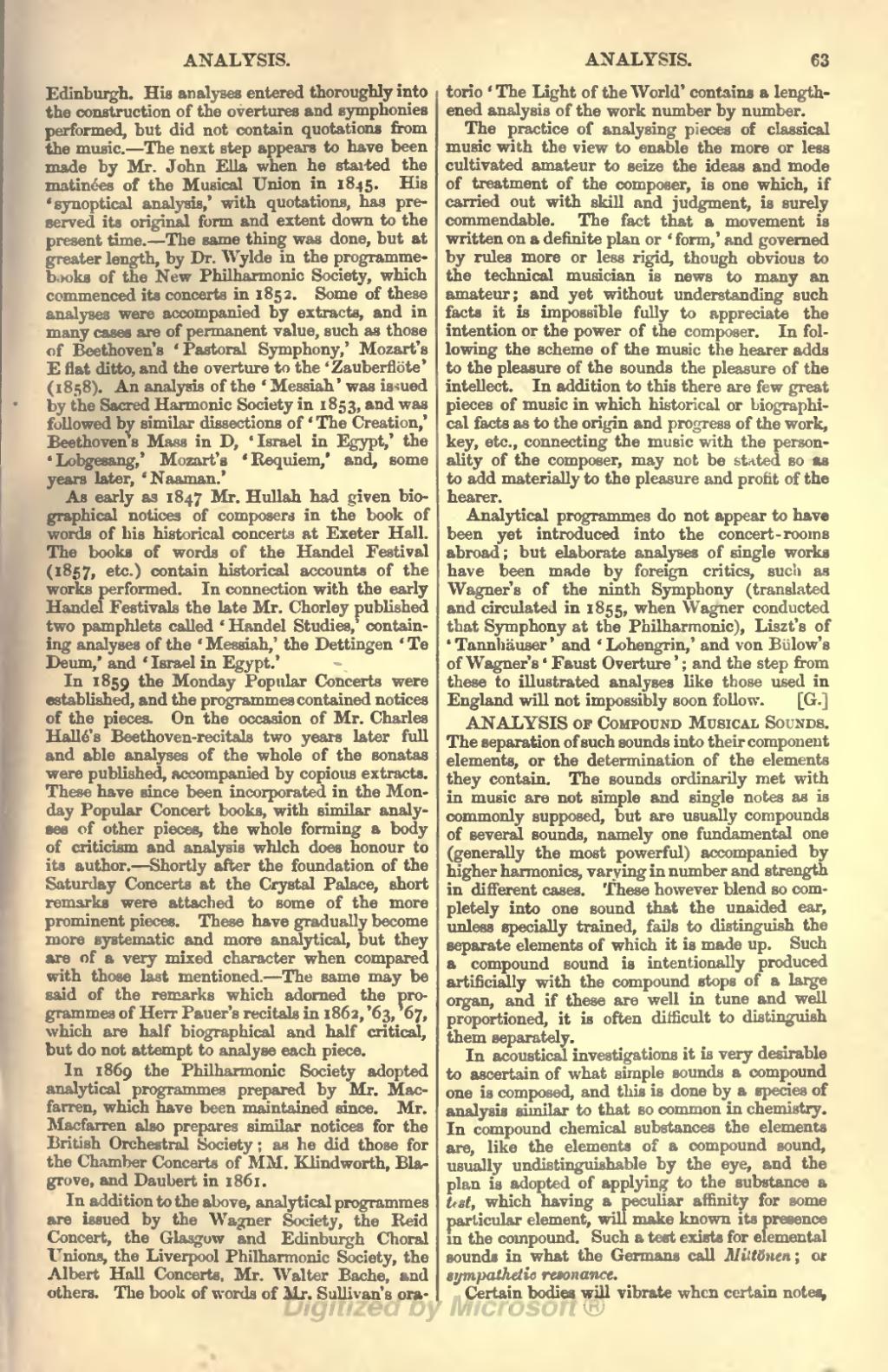Edinburgh. His analyses entered thoroughly into the construction of the overtures and symphonies performed, but did not contain quotations from the music. The next step appears to have been made by Mr. John Ella when he started the matinees of the Musical Union in 1845. His 'synoptical analysis,' with quotations, has preserved its original form and extent down to the present time. The same thing was done, but at greater length, by Dr. Wylde in the programme-books of the New Philharmonic Society, which commenced its concerts in 1852. Some of these analyses were accompanied by extracts, and in many cases are of permanent value, such as those of Beethoven's 'Pastoral Symphony,' Mozart's E flat ditto, and the overture to the 'Zauberflote' (1858). An analysis of the ' Messiah ' was issued by the Sacred Harmonic Society in 1853, and was followed by similar dissections of 'The Creation,' Beethoven's Mass in D, 'Israel in Egypt,' the Lobgesang,' Mozart's 'Requiem,' and, some years later, 'Naaman.'
As early as 1847 Mr. Hullah had given biographical notices of composers in the book of words of his historical concerts at Exeter Hall. The books of words of the Handel Festival (1857, etc.) contain historical accounts of the works performed. In connection with the early Handel Festivals the late Mr. Chorley published two pamphlets called 'Handel Studies,' containing analyses of the 'Messiah,' the Dettingen 'Te Deum,' and 'Israel in Egypt.'
In 1859 the Monday Popular Concerts were established, and the programmes contained notices of the pieces. On the occasion of Mr. Charles Halle's Beethoven-recitals two years later full and able analyses of the whole of the sonatas were published, accompanied by copious extracts. These have since been incorporated in the Monday Popular Concert books, with similar analyses of other pieces, the whole forming a body of criticism and analysis which does honour to its author. Shortly after the foundation of the Saturday Concerts at the Crystal Palace, short remarks were attached to some of the more prominent pieces. These have gradually become more systematic and more analytical, but they are of a very mixed character when compared with those last mentioned. The same may be said of the remarks which adorned the programmes of Herr Pauer's recitals in 1862, '63, '67, which are half biographical and half critical, but do not attempt to analyse each piece.
In 1869 the Philharmonic Society adopted analytical programmes prepared by Mr. Macfarren, which have been maintained since. Mr.Macfarren also prepares similar notices for the British Orchestral Society; as he did those for the Chamber Concerts of MM. Klind worth, Blagrove, and Daubert in 1861.
In addition to the above, analytical programmes are issued by the Wagner Society, the Reid Concert, the Glasgow and Edinburgh Choral Unions, the Liverpool Philharmonic Society, the Albert Hall Concerts, Mr. Walter Bache, and others. The book of words of Mr. Sullivan's oratorio 'The Light of the World' contains a lengthened analysis of the work number by number.
The practice of analysing pieces of classical music with the view to enable the more or less cultivated amateur to seize the ideas and mode of treatment of the composer, is one which, if carried out with skill and judgment, is surely commendable. The fact that a movement is written on a definite plan or 'form,' and governed by rules more or less rigid, though obvious to the technical musician is news to many an amateur; and yet without understanding such facts it is impossible fully to appreciate the intention or the power of the composer. In following the scheme of the music the hearer adds to the pleasure of the sounds the pleasure of the intellect. In addition to this there are few great pieces of music in which historical or biographical facts as to the origin and progress of the work, key, etc., connecting the music with the personality of the composer, may not be stated so as to add materially to the pleasure and profit of the hearer.
Analytical programmes do not appear to have been yet introduced into the concert-rooms abroad; but elaborate analyses of single works have been made by foreign critics, such as Wagner's of the ninth Symphony (translated and circulated in 1855, when Wagner conducted that Symphony at the Philharmonic), Liszt's of 'Tannhauser' and 'Lohengrin,' and von Bülow's of Wagner's 'Faust Overture'; and the step from these to illustrated analyses like those used in England will not impossibly soon follow.
ANALYSIS of Compound Musical Sounds. The separation of such sounds into their component elements, or the determination of the elements they contain. The sounds ordinarily met with in music are not simple and single notes as is commonly supposed, but are usually compounds of several sounds, namely one fundamental one (generally the most powerful) accompanied by higher harmonics, varying in number and strength in different cases. These however blend so completely into one sound that the unaided ear, unless specially trained, fails to distinguish the separate elements of which it is made up. Such a compound sound is intentionally produced artificially with the compound stops of a large organ, and if these are well in tune and well proportioned, it is often difficult to distinguish them separately.
In acoustical investigations it is very desirable to ascertain of what simple sounds a compound one is composed, and this is done by a species of analysis similar to that so common in chemistry. In compound chemical substances the elements are, like the elements of a compound sound, usually undistinguishable by the eye, and the plan is adopted of applying to the substance a test, which having a peculiar affinity for some particular element, will make known its presence in the compound. Such a test exists for elemental Bounds in what the Germans call Mittönen; or sympathetic resonance.
Certain bodies will vibrate when certain notes,
